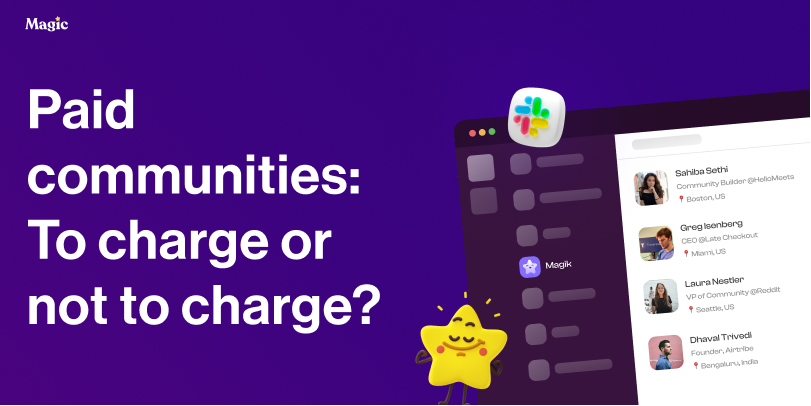Sorry if this sounds a little clickbait-y; I really don't want you to start a new community—at least not before you read this post till the end.
Don't get me wrong, online communities are essential for businesses, and I have learned so much from being part of different communities.
But starting new communities, only to abandon it a few weeks later because everybody joined, but nobody bothered starting a conversation, is a waste of time—of both you and those who join your community.
No, I won't be getting into "how to build a community"; David did a way better job at it on Lenny's Newsletter.
I'm here to tell you how not to start a new community. Or how things can and will go wrong—and how to make it right when they do go wrong.
Based on actual incidents.
Don't consider google search results as your market research
The best way to build a vibrant community is to become the thought leader of your community. And not just on your platform itself, but outside of it as well. You want people to get to know you as the go-to person for the topic you're building your community around.
Don't worry; you don't have to know everything; connecting the right people will already go a long way in becoming the thought leader in your field.
Don't Assume things
When you assume things, you risk making mistakes or alienating your members. You might think you know what is best for your community and members, but can you be sure?
A great thing about online communities is that you can test things. Want to know if your events are driving engagement? You can see how many people sign up, attend, stay to the end and engage with the topic after the event is finished. Want to know if specific blog post topics are successful?
You can also directly ask your members what they would like to see or what kind of content they are most interested in. You can do this as a poll, discussion thread, or survey.
Why guess what your members would like when you ask them or measure the actual engagement?
Create original content
Don't underestimate how important regular content updates are to making your community feel active and inviting. Make sure to post something at least two or three times a week at regular intervals.
But creating original content can be challenging and time-consuming, especially if writing is not your expertise. But the more original content you create, the more interested and engaged your members will be. Of course, you don't have to write captivating blog posts! Content can come in all forms and formats: online events, ideation challenges, discussion topics, polls, quizzes, and more.
Another way to make sure there is always something new and exciting on the platform is to encourage your members to create content of their own. Ask members to write guest blog posts on topics they are experts on or host online webinars.
Don't ignore negative feedback.
We know you're working hard in your community so that negative feedback can be annoying. Keep in mind: people critique the things they care about, so generally, most negative feedback will come from people who want your community to succeed as much as you do. Simultaneously, some complaints are also hard to respond to. Remember that people who complain want to be heard. Acknowledge their critique, thank them for their feedback and say you'll look into it.
Be sure to give feedback to the person or people who complained if you decide to make some changes based on their negative feedback, and credit them publicly for helping you make improvements to your community! Of course, for more controversial complaints, you can always choose to engage with the person or people in question more privately, via private message or email. Just make sure you let the rest of the community know you are taking this 'off-site' when you do.
Create a good onboarding process
Getting new members is great, but keeping them is better! The last thing you want is to see new members drop off after a month or two. How do you prevent this from happening? You onboard them in a way that makes them feel instantly part of the community.
Here are a few onboarding tactics you can use:
- Create a community guide & FAQ page.
- Create a welcome video that includes a tour of the community platform.
- Create starter activities for new members, such as introducing themselves to the community with a post.
- Create a mentorship program where new members are paired with established members.
- Create a 'newbies' group where new members get to connect.
- Create an online onboarding course for new members to get acquainted with the community, the platform, or the organization itself.




